SADHANA! PRACTICE!
Verses of Vemana-11
Anagananaga raga matisayilluchunundu
tinaga tinaga vemu tiyyanundu
sadhanamuna panulu samakuru dharalona
Viswadhaabhiraama, Vinura Vema
COMMENTARY: Sadhana! Practice! What a grand idea! Martha Graham, the great American dancer, understood it. She says, “Practice means to perform, over and over again in the face of all obstacles, some act of vision, of faith, of desire. Practice is a means of inviting the perfection desired.” Vemana illustrates this with two examples: one, that we improve our singing ability with repeated practice of a raga; two, that neem leaves eaten regularly over a period lose its bitter taste. This then is the transforming power of practice. ‘Everything is possible with practice and it is amazing what we can train ourselves to do, so it becomes “natural” in time’.
சாதனா! பயிற்சி!
வேமனன் வசனங்கள்-11
அனகனநாக ராகம் மதிசயில்லுச்சுனுண்டு
தினக தினக வேமு திய்யனுண்டு
சாதனமுன பனுலு சமகுரு தரலோனா
விஸ்வதாபிராம, வினுர வேமா
வர்ணனை: சாதனா! பயிற்சி! என்ன ஒரு பெரிய யோசனை! சிறந்த அமெரிக்க நடனக் கலைஞரான மார்த்தா கிரஹாம் அதைப் புரிந்து கொண்டார். அவர் கூறுகிறார், “பயிற்சி என்பது எல்லா தடைகளையும் எதிர்கொண்டு, சில பார்வை, நம்பிக்கை, ஆசை போன்ற செயல்களைச் செய்வதாகும். பயிற்சி என்பது விரும்பிய பரிபூரணத்தை அழைப்பதற்கான ஒரு வழியாகும். வேமனா இதை இரண்டு எடுத்துக்காட்டுகளுடன் விளக்குகிறார்: ஒன்று, ஒரு ராகத்தை மீண்டும் மீண்டும் பயிற்சி செய்வதன் மூலம் நமது பாடும் திறனை மேம்படுத்துகிறோம்; இரண்டு, வேப்ப இலைகளை தொடர்ந்து சாப்பிட்டு வந்தால் அதன் கசப்புச் சுவை குறையும். இது நடைமுறையின் மாற்றும் சக்தியாகும். பயிற்சியின் மூலம் அனைத்தும் சாத்தியமாகும், மேலும் நாம் என்ன செய்ய பயிற்சி பெறுவது ஆச்சரியமாக இருக்கிறது, எனவே அது சரியான நேரத்தில் "இயற்கையானது".
THE NATURE OF THE COWARD
Verses of Vemana-12
Medi pandu chooda melimai undunu
Potta vippichuda purugulundu
Pirikivani madini binka meeladura
Viswadhaabhiraama, Vinura Vema
COMMENTARY: Courage is not the absence of fear but as Nelson Mandela put it, courage is the triumph over it. He goes on to add that the brave man is not he who does not feel afraid, but he who conquers that fear. The coward on the other hand gives in to the temptation of fear and misses the magnitude of life.
The irony is that the coward does not have the nerve to acknowledge his trepidation and hides behind the hollow façade of courage, hoping against hope that his pretense will not be discovered. It does not take long for a discerning man to find out the truth.
Vemana’s analogy is simply superb. He compares the coward to a fig, which glitters on the surface, but whose pulpy inside hides worms. More than three hundred centuries later, Alfred Adlera the Austrian medical doctor and psychologist, founder of the school of individual psychology, spoke of this affectation when he said that superiority complex was a cover up for an inferiority complex.
Ancient Indian wisdom in a new bottle!
கோழையின் இயல்பு
வேமனின் வசனங்கள்-12
மெடி பண்டு சூடா மெலிமை உண்டுனு
போட்டா விப்பிச்சுடா புருகுலுண்டு
பிரிகிவனி மதினி பின்க மீலாதுரா
விஸ்வதாபிராம, வினுர வேமா
வர்ணனை: தைரியம் என்பது பயம் இல்லாதது அல்ல, ஆனால் நெல்சன் மண்டேலா கூறியது போல், தைரியம் அதன் மீது வெற்றியாகும். தைரியமானவன் பயப்படாதவன் அல்ல, அந்த பயத்தை வெல்பவனே என்று அவர் மேலும் கூறுகிறார். மறுபுறம் கோழை பயத்தின் சோதனைக்கு அடிபணிந்து வாழ்க்கையின் அளவை இழக்கிறது.
முரண்பாடான விஷயம் என்னவென்றால், கோழைக்கு தனது நடுக்கத்தை ஒப்புக்கொள்ளும் நரம்பு இல்லை மற்றும் தைரியத்தின் வெற்று முகப்பின் பின்னால் ஒளிந்துகொள்கிறது, அவரது பாசாங்கு கண்டுபிடிக்கப்படாது என்ற நம்பிக்கைக்கு எதிராக. பகுத்தறிவுள்ள ஒரு மனிதனுக்கு உண்மையைக் கண்டுபிடிக்க அதிக நேரம் எடுக்காது.
வேமனின் ஒப்பிலக்கணம் மிக அருமை. அவர் கோழையை ஒரு அத்திப்பழத்துடன் ஒப்பிடுகிறார், அது மேற்பரப்பில் பளபளக்கிறது, ஆனால் அதன் கூழ் உள்ளே புழுக்களை மறைக்கிறது. முந்நூறு நூற்றாண்டுகளுக்குப் பிறகு, ஆஸ்திரிய மருத்துவ மருத்துவரும் உளவியலாளருமான ஆல்ஃபிரட் அட்லெரா, தனிப்பட்ட உளவியல் பள்ளியின் நிறுவனர், மேன்மை என்பது ஒரு தாழ்வு மனப்பான்மையை மறைப்பதாகக் கூறியபோது இந்த பாதிப்பைப் பற்றி பேசினார்.
THE SPEECH OF THE NOBLE AND THE IGNOBLE
Verses of Vemana-13
Alpudepudu palku aadambaramuganu
Sajjanundu paluku challaganu
Kanchu mrogunattu kanakambu mroguna
Viswadhaabhiraama, Vinura Vema
COMMENTARY: Of the many distinctions between a man of lowly character –‘Pasu’- and one of noble disposition-‘Pasupathi’- the most clearly discernible is speech, for, out of the abundance of the heart, the mouth speaks (Luke 6:45). The former is ostentatious like the sound made by bell metal while the latter is gentle like the one made by gold.
Words, thus, mirror the workings of the heart. Sai Baba of Shirdi puts it brilliantly. He says that speech is the armament of man; other animals have fleetness of foot, sharpness of claw, fang, horn, tusk, beak and talon. But man has sweetness of speech, which can disarm all opposition and defeat all the designs of hatred. Sweetness makes you Divine; harshness makes you bestial. It is no small matter when one realizes that wars have been fought over one warped word!
உன்னதமான மற்றும் இழிவானவர்களின் பேச்சு
வேமனன் வசனங்கள்-13
அல்புதேபுடு பல்கு ஆதம்பரமுகனு
சஜ்ஜனுண்டு பழுகு சல்லகானு
கஞ்சு ம்ருகுனத்து கனகம்பு ம்ருகுணா
விஸ்வதாபிராம, வினுர வேமா
வர்ணனை: தாழ்ந்த குணம் கொண்ட மனிதனுக்கும் - 'பசு'- மற்றும் உன்னத மனப்பான்மை கொண்ட ஒருவன்-'பசுபதி'-க்கும் இடையே உள்ள பல வேறுபாடுகளில், மிகவும் தெளிவாகப் புரிந்துகொள்ளக்கூடியது பேச்சு, ஏனென்றால், இதயத்தின் மிகுதியால், வாய் பேசுகிறது (லூக்கா 6 :45). முந்தையது மணி உலோகத்தால் செய்யப்பட்ட ஒலியைப் போல ஆடம்பரமாகவும், பிந்தையது தங்கத்தால் செய்யப்பட்டதைப் போல மென்மையாகவும் இருக்கும்.
வார்த்தைகள், இதயத்தின் செயல்பாட்டை பிரதிபலிக்கின்றன. ஷீரடி சாய்பாபா அற்புதமாகச் சொல்கிறார். பேச்சு மனிதனின் ஆயுதம் என்கிறார்; மற்ற விலங்குகள் காலின் வேகம், நகங்களின் கூர்மை, கோரைப்பற்கள், கொம்பு, தந்தம், கொக்கு மற்றும் கொம்பு ஆகியவற்றைக் கொண்டுள்ளன. ஆனால் மனிதனிடம் பேச்சின் இனிமை உள்ளது, இது அனைத்து எதிர்ப்பையும் நிராயுதபாணியாக்குகிறது மற்றும் வெறுப்பின் அனைத்து வடிவமைப்புகளையும் தோற்கடிக்க முடியும். இனிப்பு உங்களை தெய்வீகமாக்குகிறது; கடுமை உங்களை மிருகமாக்குகிறது. ஒரு திரிக்கப்பட்ட வார்த்தையால் போர்கள் நடந்துள்ளன என்பதை ஒருவர் உணரும்போது அது சிறிய விஷயமல்ல!
FAULTFINDER: THE MORAL SCAVENGER
Verses of Vemana-14
Tappulennuvaru Tandopatandambu
Lurvi janulakella nundu tappu
Tappu lennuvaru tamatappu lerugaru
Viswadhaabhiraama, Vinura Vema
COMMENTARY: Vemana says that the world is replete with people who are busy finding fault with others. Their searchlight is always directed towards others. They fail to understand that everyone has faults. That man is neither flawless nor immaculate. But ironically, those who readily notice the slightest shade of blemish turn a blind eye to the stains in themselves.
“Happy are those who find fault with themselves instead of finding fault with others” so goes a Sufi proverb.
தப்பு துலக்கி: தார்மீக துப்புரவு செய்பவர்
வேமனின் வசனங்கள்-14
தப்புலென்னுவரு தண்டோபதண்டாம்பு
லுர்வி ஜானுலகெல்லாம் நுண்டு தப்பு
தப்பு லென்னுவரு தமடப்பு லேருகரு
விஸ்வதாபிராம, வினுர வேமா
வர்ணனை: பிறருடைய குறைகளைக் கண்டறிவதில் மும்முரமாக இருப்பவர்களால் உலகம் நிறைந்திருக்கிறது என்று வேமனன் கூறுகிறார். அவர்களின் தேடல் விளக்கு எப்போதும் மற்றவர்களை நோக்கியே இருக்கும். ஒவ்வொருவருக்கும் குறைகள் உண்டு என்பதை அவர்கள் புரிந்து கொள்ளத் தவறுகிறார்கள். அந்த மனிதன் குறையற்றவனும் அல்ல, மாசற்றவனும் அல்ல. ஆனால் முரண்பாடாக, கறையின் சிறிதளவு நிழலை உடனடியாகக் கவனிப்பவர்கள் தங்களுக்குள் இருக்கும் கறைகளுக்கு கண்மூடித்தனமாக மாறுகிறார்கள்.
"மற்றவர்களின் குறைகளைக் கண்டுபிடிப்பதற்குப் பதிலாகத் தன்மீது குறைகளைக் கண்டுபிடிப்பவர்கள் மகிழ்ச்சியானவர்கள்" என்பது ஒரு சூஃபி பழமொழி.
PURITY OF HEART
Verses of Vemana-15
Atmasuddhi leni acharamadi ela
Bhandasuddhi leni pakamadi ela
Chittasuddi leni sivpujalelara
Viswadhaabhiraama, Vinura Vema
COMMENTARY: Vemana strikes out at the hollowness of external practices. A practice or a custom, a rule or a fashion, a mode, a course of conduct or religious observance, what avail are they without sincerity, without purity of heart? A mind or intellect that is not unpolluted is no fit altar to worship the divine. But purity of heart is a very big thing.
Lord Krishna says, “To achieve purity of heart, one must observe cleanliness…be compassionate towards all beings, and perform the appropriate duties of life.” Yet, how often we miss the point and metaphorically partake food prepared in an unclean vessel.
இதயத்தின் தூய்மை
வேமனின் வசனங்கள்-15
ஆத்மசுத்தி லேனி ஆச்சரமதி எலா
பந்தாசுத்தி லேனி பகமாடி எலா
சித்தசுத்தி லேனி சிவபூஜலேலரா
விஸ்வதாபிராம, வினுர வேமா
வர்ணனை: வேமனன் புறப் பழக்க வழக்கங்களின் வெற்றுத் தன்மையைத் தாக்குகிறான். ஒரு நடைமுறை அல்லது ஒரு பழக்கம், ஒரு விதி அல்லது ஒரு நாகரீகம், ஒரு முறை, ஒரு நடத்தை அல்லது மத அனுசரிப்பு, நேர்மை இல்லாமல், இதயத் தூய்மை இல்லாமல் அவர்களால் என்ன பலன்? மாசுபடாத மனமோ, புத்தியோ தெய்வ வழிபாட்டுக்கு ஏற்ற பலிபீடம் அல்ல. ஆனால் இதயத்தின் தூய்மை என்பது மிகப் பெரிய விஷயம்.
பகவான் கிருஷ்ணர் கூறுகிறார், "இதயத்தின் தூய்மையை அடைய, ஒருவர் தூய்மையைக் கடைப்பிடிக்க வேண்டும் ... அனைத்து உயிரினங்கள் மீதும் கருணையுடன் இருக்க வேண்டும், மேலும் வாழ்க்கையின் சரியான கடமைகளைச் செய்ய வேண்டும்." ஆயினும்கூட, நாம் எவ்வளவு அடிக்கடி புள்ளியைத் தவறவிட்டு, அசுத்தமான பாத்திரத்தில் தயாரிக்கப்பட்ட உணவை உருவகமாக சாப்பிடுகிறோம்.
THE PRINCIPLE OF LOVE
Verses of Vemana-16
Champadaginatti satruvu tana cheta
Chikkina keedu cheyaradu
Posaga melu chesi pommanute melu
Viswadhaabhiraama, Vinura Vema
COMMENTARY: The Ramayana urges the need for exercising compassion even towards those who enjoy injuring others or those of cruel deeds when they are actually committing them (Ramayana, Yuddha Kanda).
Vemana too echoes the idea in this verse. He advocates that when an enemy worthy of death falls into your hands do not harm him; rather do good to him and let him go. In fact, it is simple common sense.
The law of retaliation, of an eye for eye, tooth for tooth, hand for hand, foot for foot, burning for burning, wound for wound, stripe for stripe (Exodus 21: 24,25) will make the whole world maimed.
Returning good for evil is the sure sign of a noble soul, a soul governed by the highest principle, the principle of love.
அன்பின் கொள்கை
வேமனின் வசனங்கள்-16
சம்பதகினத்தி சத்ருவு தன சேத
சிக்கின கீடு செய்யாடு
பொசாக மேலு சேசி பொம்மானுடே மேலு
விஸ்வதாபிராம, வினுர வேமா
வர்ணனை: மற்றவர்களை காயப்படுத்துவதில் மகிழ்ச்சியடைபவர்களிடமோ அல்லது கொடூரமான செயல்களை அவர்கள் உண்மையில் செய்யும்போது (ராமாயணம், யுத்த காண்டம்) இரக்கம் காட்ட வேண்டியதன் அவசியத்தை ராமாயணம் வலியுறுத்துகிறது.
இக்கருத்தை வேமனனும் இப்பாடலில் எதிரொலிக்கிறான். மரணத்திற்கு தகுதியான ஒரு எதிரி உங்கள் கைகளில் விழும்போது அவருக்கு தீங்கு செய்யாதீர்கள் என்று அவர் வாதிடுகிறார்; மாறாக அவருக்கு நல்லது செய்து விட்டு விடுங்கள். உண்மையில், இது எளிமையான பொது அறிவு.
கண்ணுக்குக் கண், பல்லுக்குப் பல், கைக்குக் கை, காலுக்குக் கால், வெந்ததற்கு வெந்து, காயத்துக்குக் காயம், பட்டைக்குக் கோடு என்ற பழிவாங்கும் சட்டம் (புற. 21:24,25) உலகம் முழுவதையும் ஊனமாக்கிவிடும்.
தீமைக்கு நல்லதை திருப்பித் தருவது உன்னத ஆன்மாவின் உறுதியான அறிகுறியாகும், உயர்ந்த கொள்கை, அன்பின் கொள்கையால் நிர்வகிக்கப்படும் ஆன்மா.
ON LENDING MONEY
Verses of Vemana-17
Kanivani cheta gasuvesambichi
Venta diruguvade verrivadu
Pilli tinna kodi pilichina palukuna
Viswadhaabhiraama, Vinura Vema
COMMENTARY: Vemana’s verses encompass the whole gamut of human dealings. Here is a verse that deals with prudence in general and lending money in particular.
He says that that man is a fool who lends money to an untrustworthy man and runs behind him. Getting money from him is as impossible as getting an answer from a fowl eaten by a cat. A strikingly singular analogy!
Shakespeare’s principle of economy -husbandry- however, extends to both the lender and the borrower, for loan oft loses both itself and the friend (Hamlet, Act I – Sc. III), trustworthy or otherwise. As such, it is happier to be neither.
கடன் கொடுப்பதில்
வேமனின் வசனங்கள்-17
கனிவாணி சேட கசுவேசம்பிச்சி
வெந்த திருகுவாடே வெறிவாடு
பில்லி தின்ன கோடி பிழிச்சினா பழகுனா
விஸ்வதாபிராம, வினுர வேமா
வர்ணனை: வேமனின் வசனங்கள் மனித நடவடிக்கைகளின் முழு வரம்பையும் உள்ளடக்கியது. பொதுவாக விவேகம் மற்றும் குறிப்பாக கடன் கொடுப்பது பற்றி ஒரு வசனம் உள்ளது.
நம்பத்தகாத மனிதனுக்குக் கடன் கொடுத்து அவன் பின்னால் ஓடும் அந்த மனிதன் ஒரு முட்டாள் என்று அவர் கூறுகிறார். பூனை தின்ன கோழியிடம் இருந்து பதில் பெறுவது போல் அவனிடம் பணம் பெறுவது இயலாத காரியம். ஒரு வியக்கத்தக்க ஒற்றை ஒப்புமை!
இருப்பினும், ஷேக்ஸ்பியரின் பொருளாதாரக் கொள்கை -கடன் வழங்குபவர் மற்றும் கடன் வாங்குபவர் இருவருக்கும் நீட்டிக்கப்படுகிறது, ஏனெனில் கடன் பெரும்பாலும் தன்னையும் நண்பரையும் இழக்கிறது (ஹேம்லெட், சட்டம் I - Sc. III), நம்பகமானது அல்லது வேறு. அவ்வாறே, இருவருமே இல்லாதது மகிழ்ச்சி அளிக்கிறது.
THE COMPANY OF EVIL
Verses of Vemana-18
Verupurgu cheri vrukshambu jedagottu
Cheedapurugu cheri cheruchu
Kutsitundu cheri gunavantu cheruchu ra
Viswadhaabhiraama, Vinura Vema
COMMENTARY: Paramahansa Yogananda, the great Indian sage, made a simple yet remarkably profound statement: Environment is stronger than willpower.
If you surround yourself with good, cheerful, positive people, you will be a good, cheerful and positive person. If you associate with negative people and situations, you will, surely, in time, feel negative.
Vemana’s advice is rustic but realistic. He says that just as the rootworm befriends the roots and destroys the tree, just as the pest keeps company with the crop, and damages it, the company of the wicked corrupts even the virtuous.
For this reason, there is the need for Satsanga- association with the wise.
கூடாநட்பு
வேமனின் வசனங்கள்-18
வெருபுர்கு சேரி வ்ருக்ஷம்பு ஜெடகோட்டு
சீடப்புருகு செரி செருச்சு
குடித்துண்டு செரி குணவந்து செருச்சு ரா
விஸ்வதாபிராம, வினுர வேமா
வர்ணனை: சிறந்த இந்திய முனிவரான பரமஹம்ச யோகானந்தர், ஒரு எளிய ஆனால் குறிப்பிடத்தக்க ஆழமான அறிக்கையை வெளியிட்டார்: சுற்றுச்சூழல் மன உறுதியை விட வலிமையானது.
நீங்கள் நல்ல, மகிழ்ச்சியான, நேர்மறையான நபர்களுடன் உங்களைச் சூழ்ந்தால், நீங்கள் ஒரு நல்ல, மகிழ்ச்சியான மற்றும் நேர்மறையான நபராக இருப்பீர்கள். எதிர்மறையான நபர்களுடனும் சூழ்நிலைகளுடனும் நீங்கள் தொடர்பு கொண்டால், நீங்கள் நிச்சயமாக, காலப்போக்கில் எதிர்மறையாக உணருவீர்கள்.
வேமனின் அறிவுரை கிராமியமானது ஆனால் யதார்த்தமானது. வேர்புழு வேருடன் நட்பாகி மரத்தை அழிப்பது போல, பூச்சி பயிருடன் சேர்ந்து அதை சேதப்படுத்துவது போல, துன்மார்க்கரின் சங்கம் நல்லொழுக்கமுள்ளவர்களையும் கெடுக்கிறது என்று கூறுகிறார்.
THE SECRET OF WORK
Verses of Vemana-19
chittasudhi kaligi chesina punyambu
konchemaina nadiyu koduva gadu
vittanambu marri vurshambunaku nenta
viswadhabhirama vinura vema
COMMENTARY: In the ninth chapter of the Gita, verse 26 unveils ‘The Secret of Work’. Bhagavan Krishna says that he will accept a leaf, a flower, fruit or water, offered purely with love and devotion.
The size of the offering does not matter but the way in which it is offered. And the operating word is purity.
Vemana’s analogy reflects the spirit of Gita’s message. He says that the seed of the mighty banyan tree is small but the tree that grows out of it is gigantic. This is similar to a small good deed done with a pure heart.
As Hosea Ballou puts it purity in person and in morals is true godliness
உழைப்பின் ரகசியம்
வேமனின் வசனங்கள்-19
சித்தசுதி கலிகி செசின புண்யாம்பு
கொஞ்சமைனா நதியு கொடுவா காடு
vittanbu marri vurshambunaku nenta
விஸ்வதாபிராம வினுர வேமா
வர்ணனை: கீதையின் ஒன்பதாவது அத்தியாயத்தில், 26வது வசனம் ‘உழைப்பின் ரகசியத்தை’ வெளிப்படுத்துகிறது. முற்றிலும் அன்புடனும் பக்தியுடனும் சமர்ப்பிக்கப்பட்ட இலை, பூ, பழம் அல்லது நீரை ஏற்றுக்கொள்வேன் என்று பகவான் கிருஷ்ணர் கூறுகிறார்.
பிரசாதத்தின் அளவு முக்கியமல்ல, அது வழங்கப்படும் விதம். மேலும் செயல்படும் சொல் தூய்மை.
வேமனின் ஒப்புமை கீதையின் செய்தியின் உணர்வைப் பிரதிபலிக்கிறது. வலிமைமிக்க ஆலமரத்தின் விதை சிறியது ஆனால் அதிலிருந்து வளரும் மரம் பிரம்மாண்டமானது என்கிறார். இது தூய உள்ளத்துடன் செய்யும் சிறு நற்செயல் போன்றது.
MERIT, A MATTER OF CHARACTER NOT CASTE OR COLOR
Verses of Vemana-20
kasturinata chuda kanti nallanganundu
Parimalinchu dani parimalambu
Guruvulaina vari gunamelagura
Viswadhabhirama vinura vema
COMMENTARY: Lord Krishna says: “Chaaturvarnym mayaa sristam gunkarma vibhagasah” (Gita IV.13) i.e. four orders of society created by Me according to their Guna (qualities/behaviour) and Karma (profession/work/efforts).
Vemana was perhaps harping on this when he sings that we should not judge others by the color of their skin but by the content of their character (Dr. Martin Luther King Jr, “I Have a Dream” speech).
To illustrate this he gives the example of kasturi – musk – which is black (Good musk is of a dark purplish color) in colour yet whose sweet fragrance spreads in all directions. He goes on to say that the true Guru is like the musk and as such, one should not judge him by his external appearance but rather by his inner value.
தகுதி என்பது, சாதி அல்லது நிறம் அல்ல, அது குணம்
வேமனின் வசனங்கள்-20
கஸ்தூரினாட சூடா கண்டி
நல்லாங்கனுண்டு
பரிமளிஞ்சு தனி பரிமளம்
குருவுளைன வரி குணமேலகுரா
விஸ்வதாபிராம வினுர வேமா
வர்ணனை: பகவான் கிருஷ்ணர் கூறுகிறார்: "சாதுர்வர்ணம் மாயா சிருஷ்டம் குங்கர்ம விபாகஸஹ்" (கீதை IV.13) அதாவது அவர்களின் குணம் (குணங்கள்/நடத்தை) மற்றும் கர்மா (தொழில்/வேலை/முயற்சிகள்) ஆகியவற்றின் படி நான் உருவாக்கிய சமுதாயத்தின் நான்கு ஆணைகள்.
தோலின் நிறத்தை வைத்து மற்றவர்களை மதிப்பிடக்கூடாது, அவர்களின் குணத்தின் உள்ளடக்கத்தை வைத்து (டாக்டர் மார்ட்டின் லூதர் கிங் ஜூனியர், “எனக்கு ஒரு கனவு இருக்கிறது” பேச்சு) என்று பாடும்போது வேமனா இதைப் பற்றிப் பாடியிருக்கலாம்.
இதை விளக்குவதற்கு அவர் கஸ்தூரி - கஸ்தூரி - இது கருப்பு (நல்ல கஸ்தூரி அடர் ஊதா நிறம்) நிறத்தில் இருந்தாலும் அதன் இனிமையான நறுமணம் எல்லா திசைகளிலும் பரவுகிறது. உண்மையான குரு கஸ்தூரியைப் போன்றவர், எனவே ஒருவர் அவரை அவரது வெளிப்புற தோற்றத்தைக் கொண்டு மதிப்பிடக்கூடாது, மாறாக அவரது உள் மதிப்பைக் கொண்டு மதிப்பிட வேண்டும் என்று அவர் கூறுகிறார்.















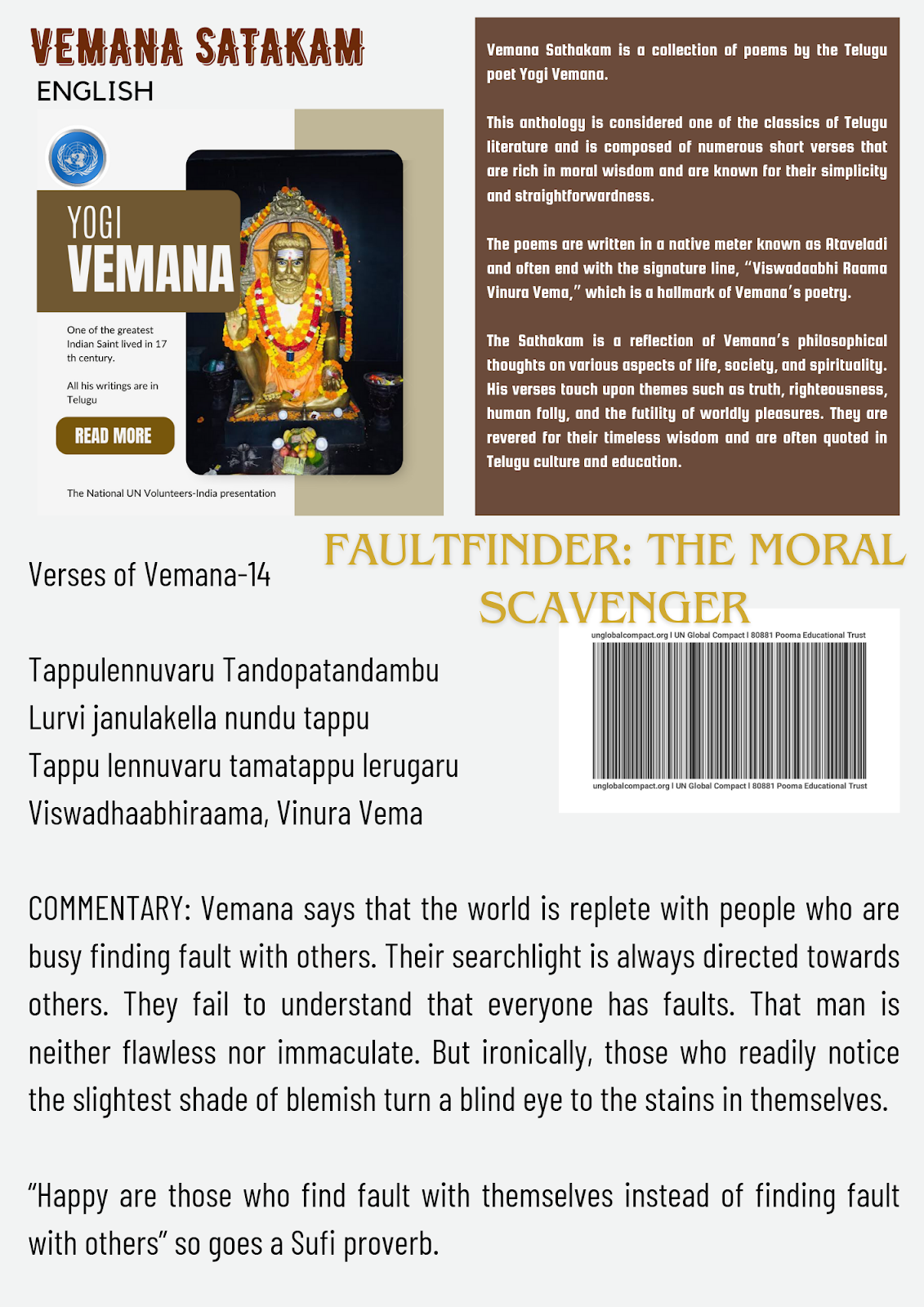
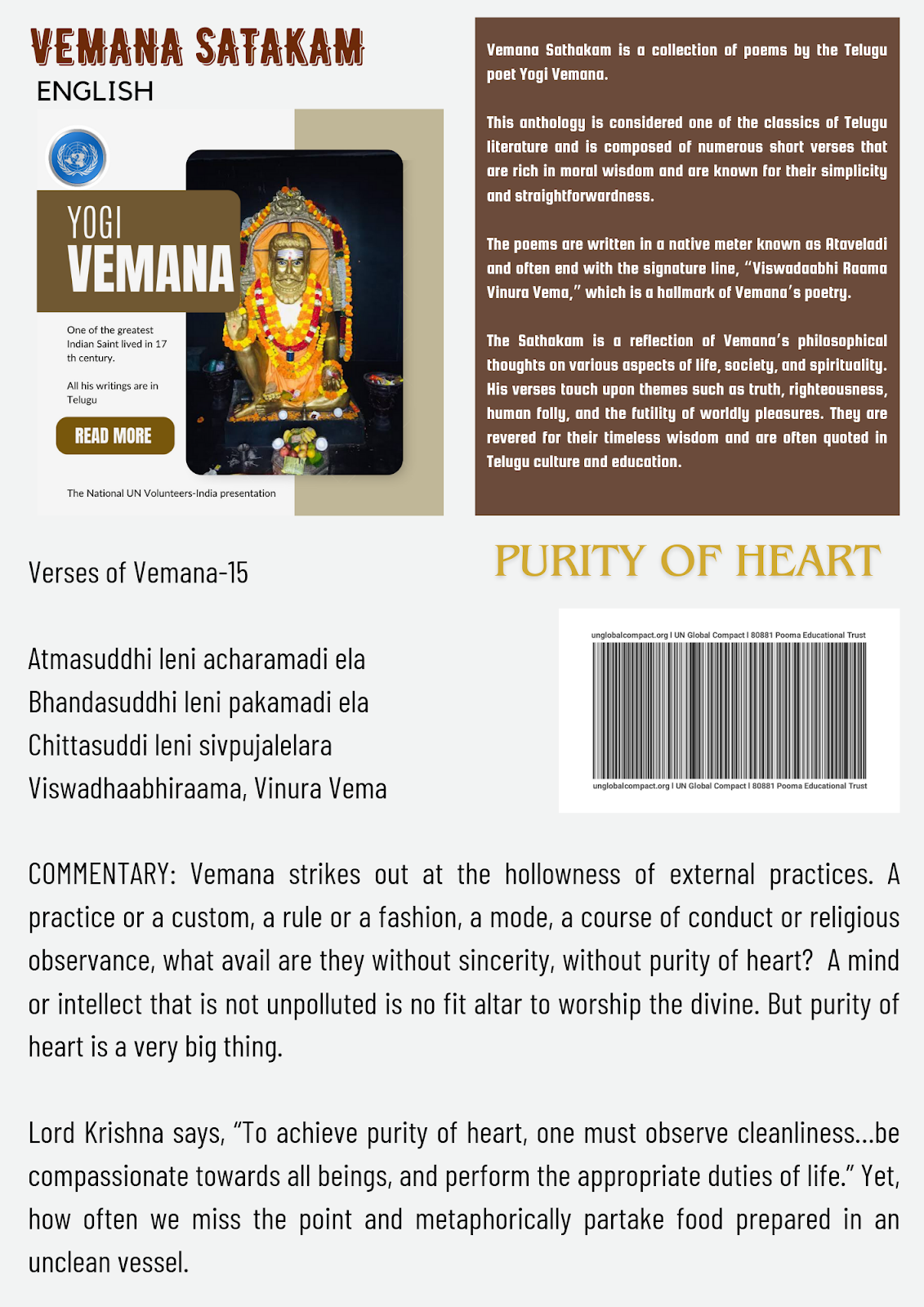

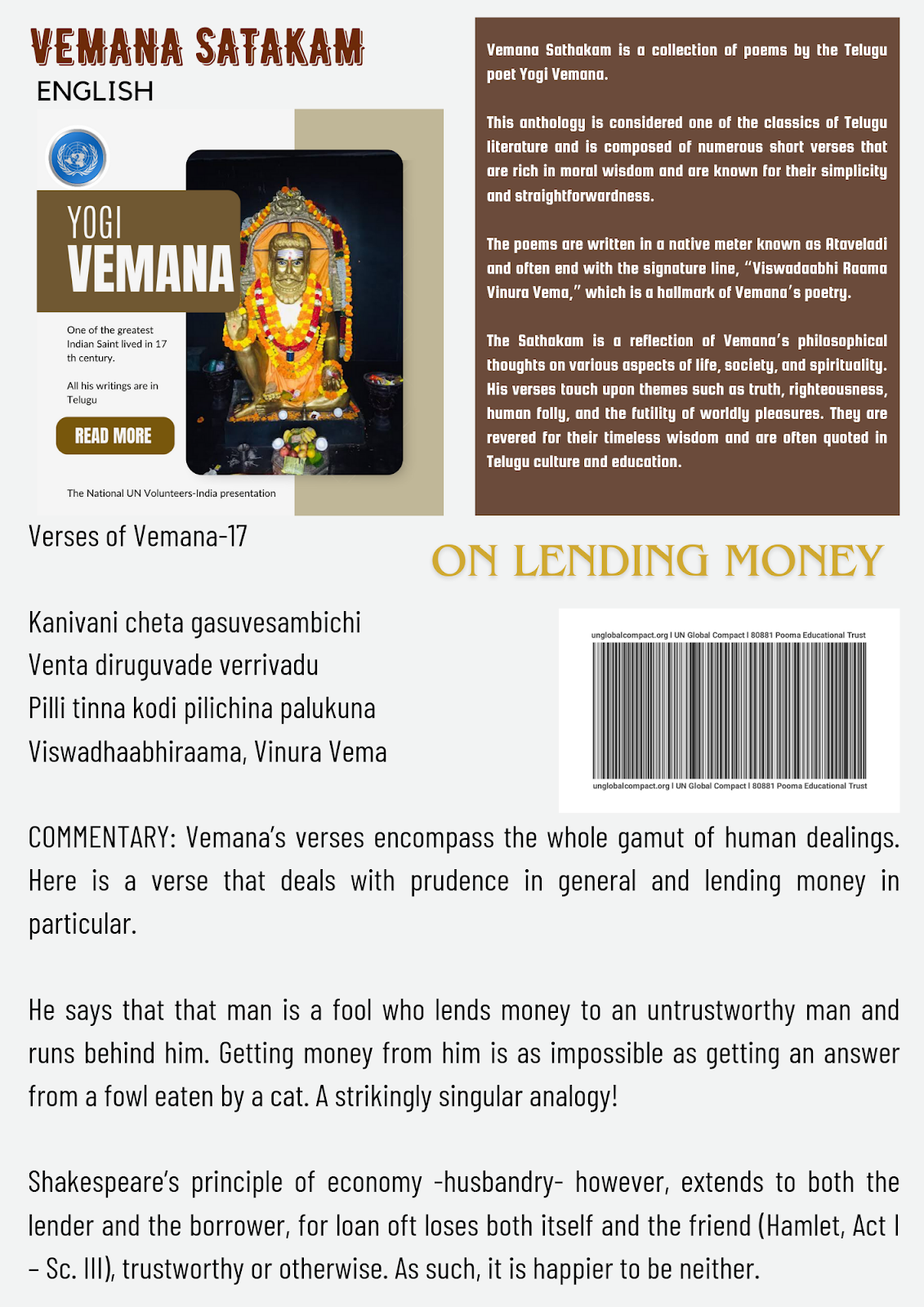
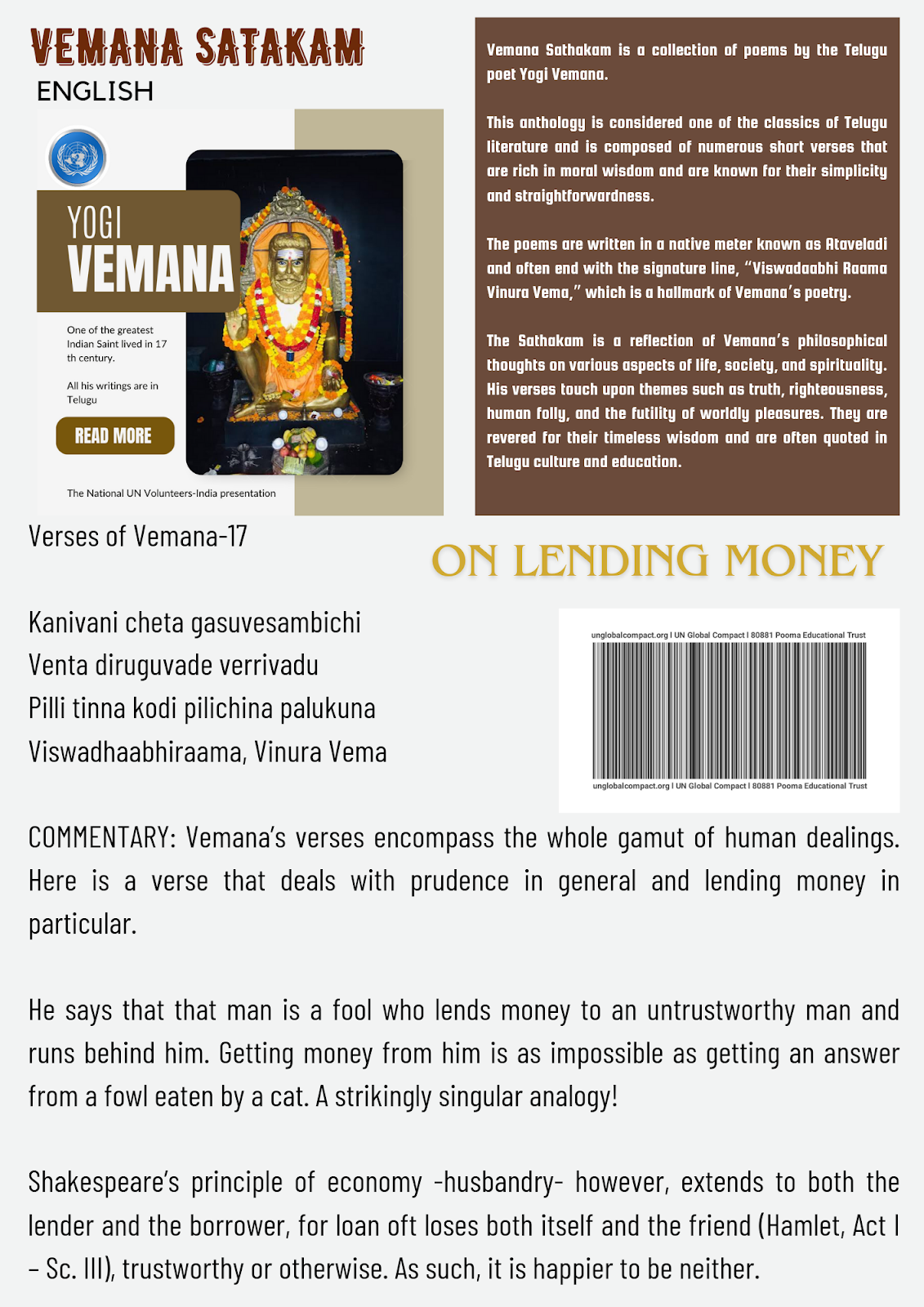

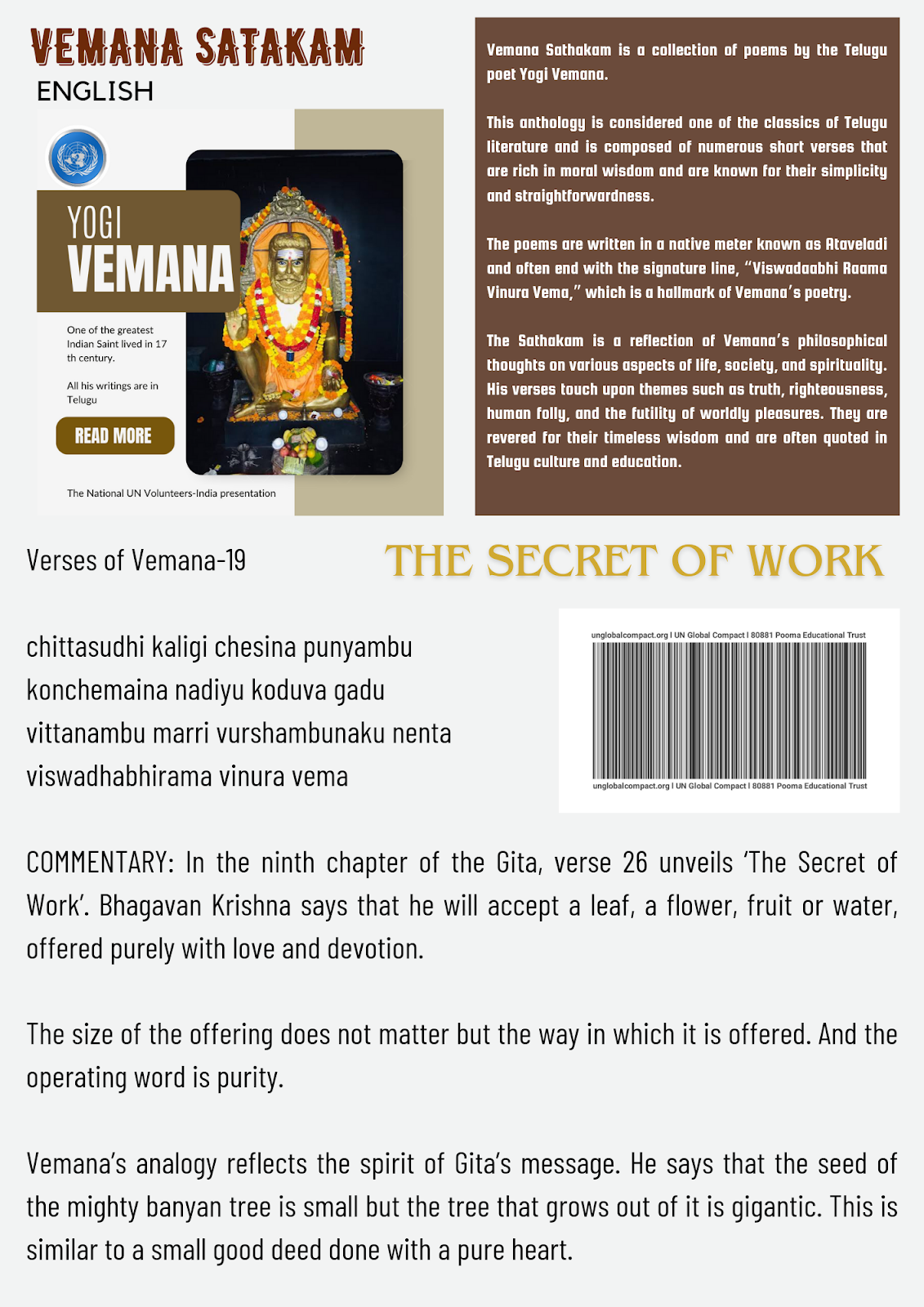
No comments:
Post a Comment